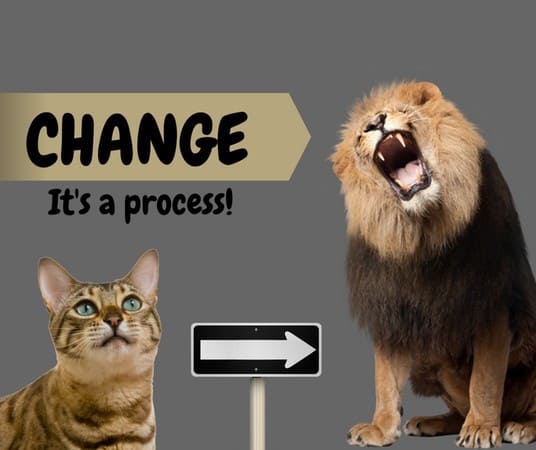
We all face decisions to make changes big and small in our lives. Did you know that change is a process? Here are the stages I see people go through:
- Not interested at all in making a change.
- Interested in making a change, but not really sure when and how you are going to go about it.
- A decision has been made that you are going to change and you begin planning, but not implementing yet.
- You are implementing changes and sticking with it.
- You have implemented these changes, reached your goal, and are now maintaining what you have accomplished.
Here are examples of the stages of change:
Need to incorporate healthy eating habits.
- Not interested or totally oblivious that I need to change my eating habits.
- I wish I ate better. I wish I could lose some weight. I want to be healthier.
- I need to change the way I eat for my health. I researched different weight-loss options, what a nutritious diet includes and consulted with a nutritionist to start a healthy food diet with the goal of watching calories to lose weight and eat well.
- I started it. I am doing it. I am still doing it. I have stuck with it.
- I have reached my goal weight, have found ways to incorporate healthy food into my diet in a way that feels sustainable for me.
Need to start or change my career.
- Not interested in beginning or changing a career at all.
- I know I need to do something different because I am not happy, but I haven’t been very motivated to look into it.
- I have been researching options like school, the military, other jobs in the area, apprenticeship opportunities, etc. I took a career assessment test and talked with a career counselor, who explained that my strengths are in analytical things. I really like numbers and decided that accounting may be something I want to do. I signed up for an accounting class at the community college and am pretty sure I want to be an accountant.
- I am going to school. I have continued along the path of completing classes going towards my degree. I got my degree and found a job.
- I am working as an accountant and am pleased with my new career, so I think I will stay!
Need to improve my relationship.
- Not interested or completely oblivious to the need to change something.
- Wondering if my partner and I are actually a good fit. Thoughts about divorce. You change your mind often, but do not take any real action.
- I have decided that we have some issues and we have talked about it. Commitments are made to do things differently. You may have decided to seek out counseling. You may decide that separation or divorce is the road you wish to pursue. Either way, a decision has been made but you have not started yet.
- We went to counseling and made a commitment to work on a variety of issues. Weeks have gone by and we are making progress.
- Counseling is over and we have implemented the things that worked well for us. Things are going well and we have not fallen back into our old patterns.
Need to quit drinking.
- Not interested or completely oblivious to the need to change my drinking.
- I have had some consequences and thought about whether or not it is a problem. I may have quit on my own and then gone back to drinking.
- Yup! I have a problem and I am ready to do something about it. I am considering AA (Alcoholics Anonymous), talking to my doctor, finding a therapist, or going to treatment.
- After some research, I decided to go to treatment because it would help me learn the most the fastest. I have completed treatment, started going to AA meetings, and have been sticking to my relapse prevention plan.
- I have maintained sobriety and am living a life in recovery with no relapses in the last year or more (some people would claim less time is needed and some would claim more).
While I put these examples in order, the reality is that change is a process and it does not always work seamlessly in perfect order. Sometimes we have setbacks. We may be in the middle of making changes and then go back into the mode of “Why am I doing this? Is this what I want to do? Am I really cut out for this?” In fact, we can rapidly move around these stages of change even in one day. How many people do you know who are on-again-off-again dieters? How many people do you know that have been on-again-off-again with relationships?
Why do I care about the process of change?
A lot of times we are stuck in stage 2. We know we need to make some changes, but aren’t clear on if we are ready or what we are willing to do to reach the goal. We get stuck and years can go by. Those years of not changing can cause us significant unhappiness and stress in our life if it is something that really needs to change.
If you can identify what stage of change you are in (1-5), then all you have to do is focus on getting to the next stage and make sure you have all the right things in place to be successful. Have you ever heard that phrase “Don’t put the cart before the horse?” Sometimes we get ahead of ourselves and get so wrapped up in all the decision making that we stall out and change nothing. Change can be hard, but it can be rewarding too. You may need help if you are stuck.
In therapy, we stay in the moment with you and figure out where you are in the process of change. Change usually occurs when a person is ready. Exploring your reasons to change and helping you make commitments to yourself is the first step. If you aren’t ready or find yourself having difficulty taking action or maintaining your change, then we explore what the underlying cause of that could be.
I promise you this: If we can identify what motivates you and can create a plan that is realistic, then you will have positive outcomes. Some people say “The time to change is NOW.” I say, “The time to change is when you are ready, so let’s figure out what is motivating you to think about making a change.
Pivotal Counseling Center has therapists with a variety of specialties. We have locations in Woodstock, Illinois, and Lake in the Hills, Illinois. If you are in need of someone to help, please consider giving us a call at (815) 345-3400.
Pivotal Counseling Center is now accepting Medicaid including Blue Cross Community Medicaid, Meridian Medicaid, and Molina Medicaid for outpatient counseling.









